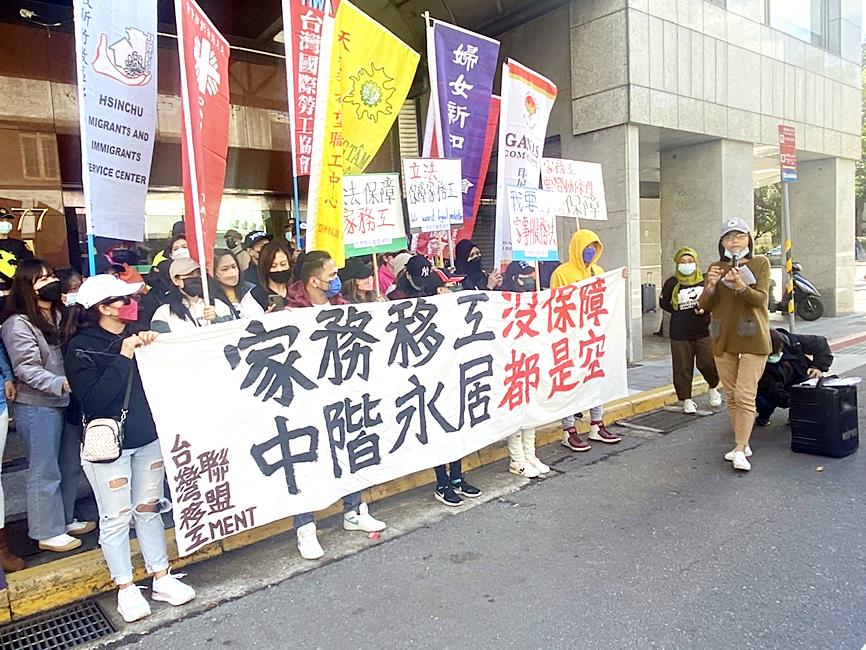Migrant workers’ rights advocates yesterday rallied in support of protections for the nation’s caregivers, the majority of whom are women who make on average only NT$17,000 per month.
To mark International Women’s Day, the Migrants Empowerment Network in Taiwan gathered in front of the Ministry of Labor in Taipei calling for stronger legal guarantees for vulnerable caregivers.
Most caregivers in Taiwan are women, but their work is not covered by the Labor Standards Act (勞動基準法), the group told a news conference at the protest.

Photo: CNA
Ministry data last year showed that 74.3 percent of caregivers reported not receiving any time off work, it said.
In the years before the COVID-19 pandemic, as many as 34 percent did not receive time off, meaning there are about 70,000 caregivers who have not had a break for years, it added.
Monthly salaries are also creeping further away from the minimum wage, which this year is NT$25,250, while the average caregiver only made NT$17,000, the group said.
That is a difference of NT$8,250, setting a new record, it said.
The cost of employing a caregiver is borne by individual households, but they should be incorporated into the government’s long-term care and social welfare system, Taiwan International Workers’ Association specialist Betty Chen (陳容柔) said.
That would ensure that labor protections are afforded to migrant caregivers under the law, while also improving the quality of care, Chen said.
A domestic services bill has been proposed to protect workers’ rights, but it has not been passed into law, she said.
The government next month is to begin a “migrant worker retention” program intended to keep longer-term residents in medium-skill positions, but the reality is that many employers do not have or are not willing to pay NT$24,000 per month to caregivers as required under the plan, she added.
Taiwan is in dire need of caregivers, but the government has not considered that the retention problem is due to a lack of labor protections, Chen said.
Improving regulations would naturally result in better retention, meaning that its “migrant retention program” would be unnecessary, she said.
That involves passing a domestic services act; ensuring a minimum salary, maximum working hours and days off; and directing public funds to families in need of long-term care, she added.
The ministry in response said that owing to the “obvious differences” inherent in caregiving work, it is difficult to apply the Labor Standards Act.
In addition, no consensus has yet been reached on a dedicated act covering the work, it said, vowing to continue implementing measures to protect the rights and interests of caregivers.
Migrant caregivers and their employers are already required to sign a contract before the worker comes to Taiwan stipulating rest days, with a minimum of one day off every seven days, the ministry said, adding that it is continuing to discuss wage adjustments with the workers’ countries of origin, taking into account changing salaries within Taiwan.

Taiwan is stepping up plans to create self-sufficient supply chains for combat drones and increase foreign orders from the US to counter China’s numerical superiority, a defense official said on Saturday. Commenting on condition of anonymity, the official said the nation’s armed forces are in agreement with US Admiral Samuel Paparo’s assessment that Taiwan’s military must be prepared to turn the nation’s waters into a “hellscape” for the Chinese People’s Liberation Army (PLA). Paparo, the commander of the US Indo-Pacific Command, reiterated the concept during a Congressional hearing in Washington on Wednesday. He first coined the term in a security conference last

Prosecutors today declined to say who was questioned regarding alleged forgery on petitions to recall Democratic Progressive Party (DPP) legislators, after Chinese-language media earlier reported that members of the Chinese Nationalist Party (KMT) Youth League were brought in for questioning. The Ministry of Justice Investigation Bureau confirmed that two people had been questioned, but did not disclose any further information about the ongoing investigation. KMT Youth League members Lee Hsiao-liang (李孝亮) and Liu Szu-yin (劉思吟) — who are leading the effort to recall DPP caucus chief executive Rosalia Wu (吳思瑤) and Legislator Wu Pei-yi (吳沛憶) — both posted on Facebook saying: “I

Sung Chien-liang (宋建樑), who led efforts to recall Democratic Progressive Party (DPP) Legislator Lee Kun-cheng (李坤城), was released on bail of NT$80,000 today amid outcry over his decision to wear a Nazi armband to questioning the night before. Sung arrived at the New Taipei District Prosecutors’ Office for questioning in a recall petition forgery case last night wearing a red armband bearing a swastika, carrying a copy of Adolf Hitler’s Mein Kampf and giving a Nazi salute. Sung left the building at 1:15am without the armband and covering the book with his coat. Lee said today that this is a serious

The Ministry of Economic Affairs has fined Taobao NT$1.2 million (US$36,912) for advertisements that exceed its approved business scope, requiring the Chinese e-commerce platform to make corrections in the first half of this year or its license may be revoked. Lawmakers have called for stricter enforcement of Chinese e-commerce platforms and measures to prevent China from laundering its goods through Taiwan in response to US President Donald Trump’s heavy tariffs on China. The Legislative Yuan’s Finance Committee met today to discuss policies to prevent China from dumping goods in Taiwan, inviting government agencies to report. Democratic Progressive Party Legislator Kuo Kuo-wen (郭國文) said